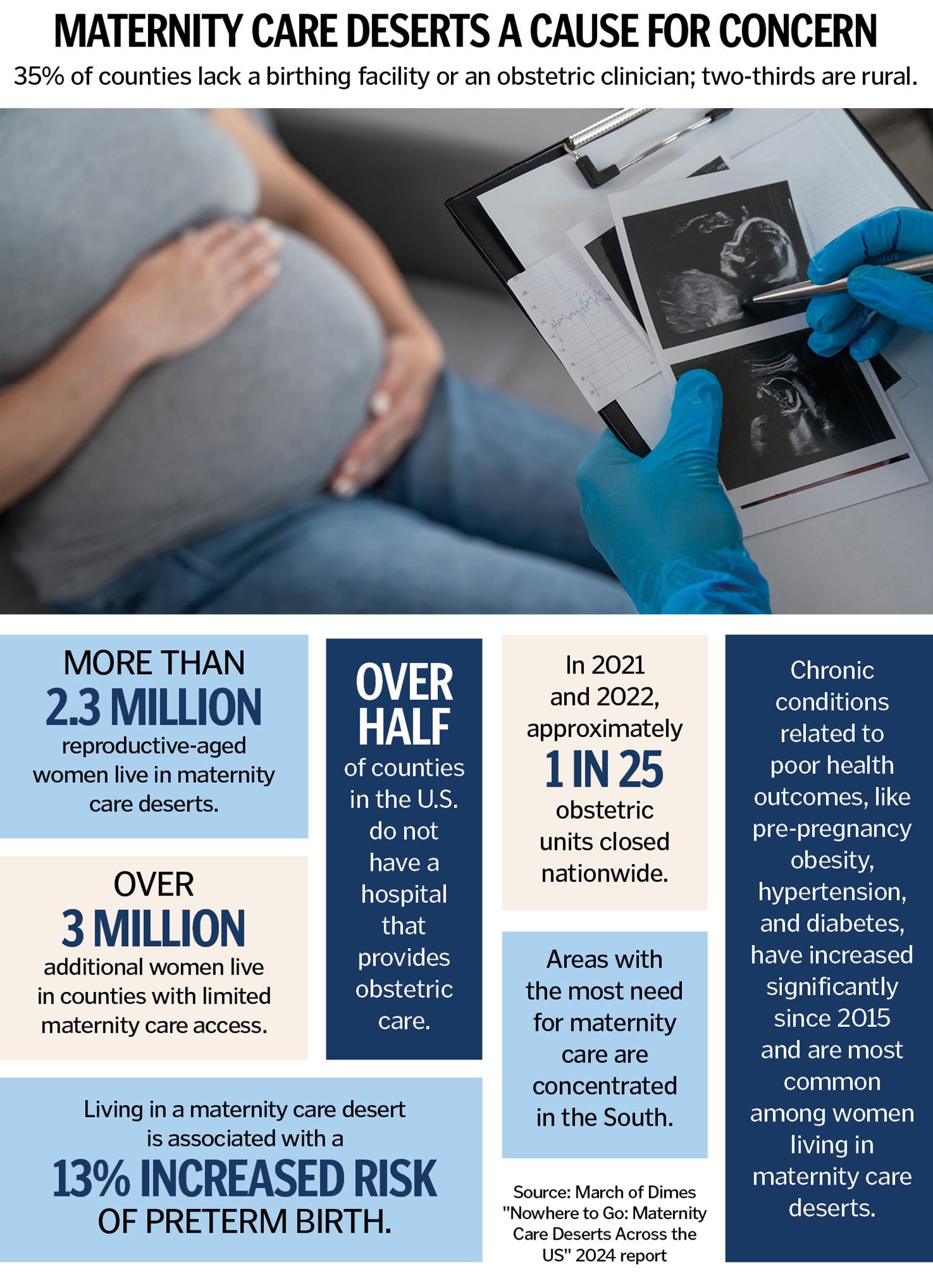Avera Health is addressing pregnancy-related disparities faced by rural women and their newborns in eastern South Dakota through a grant-funded effort using telehealth and care coordination.
Analysis by the Rural Health Information Hub, which is supported by the Health Resources and Services Administration, shows rural women and their babies experience serious health disparities and higher rates of pregnancy-related mortality than their urban counterparts.
To counter such disparities, Avera's program monitors the blood pressure of new moms as well as vital signs related to gestational diabetes. The women receive clinical intervention when their numbers are askew. The program also provides wraparound services to address social determinants of health.

Dr. Kimberlee McKay, medical research officer for the Avera Research Institute and an OB/GYN physician with Avera, said addressing health issues during the antepartum and postpartum period "can prevent deterioration of maternal health over a lifetime." She added that moms' health also can impact their babies' health over the long term.
Grant infusion
Speaking at a panel presentation at the 2025 AHA Rural Health Care Leadership Conference in San Antonio early this year, McKay said she helped to initiate Avera's program in part because data from eastern South Dakota showed that women and babies in rural areas were having worse health outcomes than those in more populated areas.
McKay and her colleagues studied the situation and determined that there was great variation in the care delivered to these women, in large part because of the women's distance from health care facilities and because of a lack of resources and staff at rural health care sites. According to Avera, which is based in Sioux Falls, South Dakota, some women in rural areas of the state must travel an hour to access primary care and some are hundreds of miles away from specialty care.
Based on successes Avera had in improving rural women's health through a 2016 virtual monitoring program for gestational diabetes, McKay and her team sought to apply the concept to other health complications of expectant and new moms in rural areas.
McKay and her team secured grant funding of $1 million per year for four years beginning in 2022 from the Health Resources and Services Administration's Rural Maternity and Obstetrics Management Strategies Program.
Some goals of the grant-funded program are to improve outcomes related to preterm labor, low birthweight, infant mortality and maternal mortality.

Avera has received other federal grants to advance the health of moms and babies. The system has received a seven-year, $47 million grant called Environmental Influences on Child Health Outcomes. Avera and other recipients of this grant form a national research network that is affiliated with the National Institutes of Health. That network is studying how early environmental influences affect children's health outcomes. Avera also has received a seven-year, $11 million NIH grant from to help establish Maternal Health Research Centers of Excellence to develop and evaluate innovative approaches to reduce pregnancy-related complications and deaths and to promote maternal health equity.
Clinical intervention and socioeconomic aid
McKay told attendees of the rural health presentation that a focus on care variation is at the heart of the work of the rural obstetric health initiative. She and her team have been collecting and analyzing patient data to determine where care quality breaks down for rural moms and their babies. The Avera team then has been developing care pathways to address the breakdowns and focusing on quality improvement in each pathway.
Remote monitoring gets at the riskiest health factors before and after delivery, especially hypertension and gestational diabetes. The multidisciplinary team also addresses social determinants of health including housing, food, transportation and economic security.
Avera McKennan Hospital & University Health Center in Sioux Falls is leading the work and collaborates with regional Avera centers in Aberdeen, Mitchell, Pierre and Yankton, all in South Dakota. Other partners include Avera@Home home health, the Access Health rural care network, South Dakota Urban Indian Health, and the South Dakota Department of Health and Department of Social Services. Also, two rural critical access hospitals in South Dakota — Milbank Area Hospital Avera in Milbank and Avera St. Benedict Hospital in Parkston — offer the program to their patients.
The future of OB care
McKay said about 5,500 babies are born annually at Avera facilities in South Dakota, about 2,300 of them at rural sites.
Avera identifies patients who could benefit from the telehealth program through health assessments and screenings. About 800 women have participated in the couple of years it has been offered.
Data collection that drives quality improvement is central to this project, McKay said. She noted that Avera already is seeing improvements in outcomes for participants. This includes decreased readmissions to the hospital after delivery.
Plans call for potential expansion of the program beyond eastern South Dakota. Additionally, McKay said Avera is exploring how to incentivize payers to invest in the program.
McKay said at the rural health conference panel that the remote monitoring and care coordination "are smoothing out the bumps in the health care delivery system."
